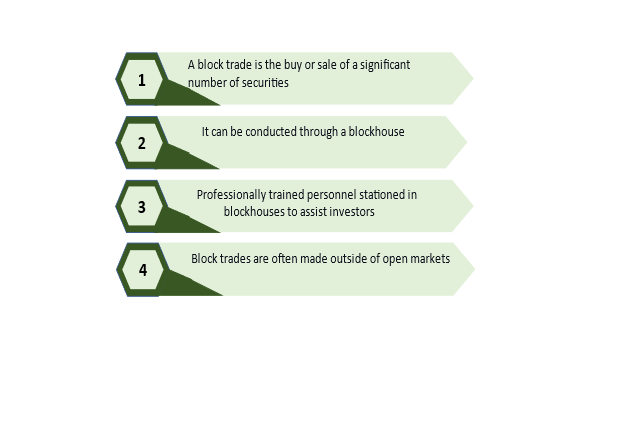What is a block trade?
A block trade is the buy or sale of a significant number of securities, including a large number of bonds or equities that are sold at an agreed price between two parties.
From traders' perspective, block trading is a means to move vast amounts of securities without the market price moving.
To reduce the impact on the security's price, block trades are often made outside of open markets. A block trade typically involves at least 10,000 shares (excluding penny stocks) or $200,000 in bonds. Thus, block trades are substantially larger than 10,000 shares in practice.
Summary
- A block trade is a contract between two parties to buy and sell financial instruments such as bonds or stocks.
- To hide the correct amount of a block trade, it is usually split up into smaller orders and performed through several brokers.
- A private purchase agreement can use to make block trades outside of the open market.
Frequently Asked Questions (FAQs)
What is the concept of a block trade?
A block trade is an agreement between two parties to buy and sell a significant number of financial products, such as bonds or shares, in a single transaction. Like financial derivatives like futures and options, block trades are executed through a privately negotiated trading mechanism.
Because a block trade involves a large number of securities being bought and sold, this trading method is generally reserved for institutional investors. These investors can use a private mediator, such as a hedge fund or investment bank, to block trade bonds and equities. Block trades can be bought and sold through several different mediators and divided into smaller transactions for ease and a faster contract.

Source: © Alexandersikov | Megapixl.com
Block trades can be conducted through a blockhouse, a financial intermediary, to assist investors with risk management. It can be thought of as a means for traders to sell and buy a large volume of securities without affecting market pricing.
As a result, professionally trained personnel stationed in blockhouses can assist in managing a security's substantial trade orders while keeping the security price stable. In addition, investors can sell their equity and block trade stock simultaneously. As a result, there should be less risk of price fluctuations when employing this strategy.
Suppose a block trade is executed on the open market. In that case, traders must exercise caution because the transaction might result in substantial volume changes and impact the market value of the stocks or bonds being purchased. As a result, rather than buying assets directly from a hedge fund or investment bank for smaller sums, block trades are frequently made through an intermediary.

Source: Kalkine Media
In futures trading, what is a block trade?
Futures trading is a contract between two parties that allows them to buy and sell financial products at a defined price at a future date. This relates to block trading, which works in a similar way but on a much greater size. It, along with forwards and options, is a type of financial derivative product.
On the other hand, these derivatives typically deal with smaller orders of securities and span markets other than stocks, such as commodities, currencies, and indices. A block deal in futures or options produces an easily recognisable contract from others in the same category.
Everything that you need to know about block trade
How do block trades promote market volatility?
Block trades have the potential to increase market volatility. Price swings can occur because of extensive, rapid moves in a particular asset. This is not good when it encourages market volatility.
For example, a hedge fund intended to sell two million shares of a particular business in 10,000-share increments. It is likely that the fund wants to diversify its holdings and has decided to sell that asset in favour of another. On the open market, however, two million shares would be available for purchase all at once. This could drive this stock price down since the market interprets this as weakness in the underlying stock, causing market volatility and incorrect stock pricing.

Source: © Arturszczybylo | Megapixl.com
What is the example of a block trade?
If a hedge fund intends to sell 2,00,000 shares of a firm for $20 each, it can do it in several discrete transactions or all at once. A blockhouse will match the vendor and buyer, arrange a deal, and carry it out to the best of its ability.
As a result, it can either sell all 200,000 shares to a single bidder or find 20 buyers willing to acquire 10,000 shares each. Moreover, all these transactions take place at the same time. This seeks to keep market volatility low and reduce slippage between deals using a blockhouse, as financial securities can often change price abruptly.
 Please wait processing your request...
Please wait processing your request...